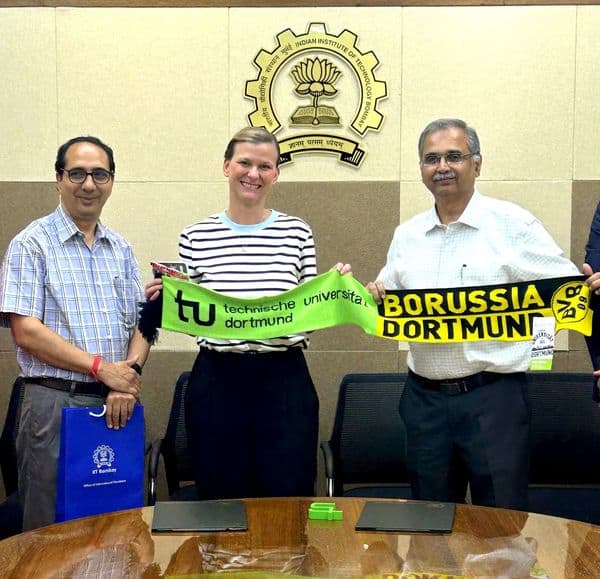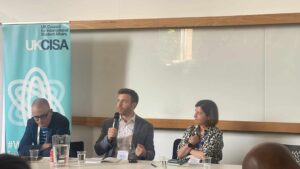The Memorandum of Understanding was exchanged by IIT Bombay‘s Milind Atrey, deputy director (academics, research and translation) and Dr. Tessa Flatten, vice president, TU Dortmund on behalf of the institutions.
“This partnership is a very important step for TU Dortmund University’s internationalisation in terms of student exchange, research collaboration and entrepreneurship cooperation,” Flatten told The PIE News.
“It is also an important component for our activities towards the Indian subcontinent as a whole.”
In Mumbai last month, the institutions signed the MoU during a recent visit by TU Dortmund officials and students from Dlab, the university’s interdisciplinary entrepreneurial program.
A key initiative this November was bringing students from TU Dortmund’s Dlab program—an interdisciplinary entrepreneurial program – to participate in a seminar at IIT Bombay’s Desai Sethi School of Entrepreneurship.
Thomas Oeldemann, TU Dortmund
“A key initiative this November was bringing students from TU Dortmund’s Dlab program – an interdisciplinary entrepreneurial program – to participate in a seminar at IIT Bombay’s Desai Sethi School of Entrepreneurship,” said Thomas Oeldemann, executive assistant, international affairs, TU Dortmund.
“We hope to establish this exchange as an annual event, broadening opportunities for students from both institutions to engage in interdisciplinary problem-solving and entrepreneurial innovation.”
Apart from attending sessions at IIT Bombay, the students also had an opportunity to visit Atomberg Technologies, a household appliance manufacturing company, and the German Consulate in Mumbai.
The partnership will focus on boosting academic and research ties, with a strong emphasis on student mobility – particularly for PhD candidates.
Students from IIT Bombay can now participate in TU Dortmund’s International Summer Program, which provides a blend of academic and cultural experiences.
Likewise, German students will have opportunities to engage with IIT Bombay through short-term exchanges, internships, or entrepreneurial initiatives such as Dlab.
In the years ahead, the institutions will continue to enhance collaborative research efforts, including joint publications.
“The partnership between TU Dortmund and IIT Bombay represents an exciting opportunity to bridge academic innovation across continents,” said Priya Nayar, executive director, University Alliance Ruhr.
“From a North American UA Ruhr perspective, we are thrilled to support this initiative and are particularly interested in exploring the trilateral potential of Germany, the United States, and India, fostering research collaboration that transcends borders and addresses global challenges.”
Based on their conversations with university professors, entrepreneurs, and startups in India, the students from TU Dortmund will now work on identifying startup solutions for any ‘unmet needs’ in the country.
With Mumbai considered as a hub of innovation and entrepreneurship in South Asia, the institute sees the city as a strategic centre for “driving impactful academic and entrepreneurial initiatives”.
Germany’s own experience with transforming the Ruhr region, where TU Dortmund is located, into a major urban and economic centre, can play a major role in the institute helping IIT Bombay with India’s entrepreneurial growth.
“Leveraging this experience, TU Dortmund can provide IIT Bombay with insights into connecting university-driven innovation with local and global markets,” said Oeldemann.
“By sharing best practices in fostering entrepreneurial mindsets, supporting startups, and building university-industry linkages, this partnership aims to create a fertile ground for mutual growth in entrepreneurship.”
TU Dortmund’s previous collaboration with Tata Institute of Social Sciences through the EU-funded SI-Drive project has established a robust foundation for future partnerships.
Building on this relationship, the recent visit also facilitated engaging discussions with TISS researchers on social innovation, a field both institutions are eager to delve into further.
The increasing number of partnerships between Indian and German institutions is significant in the context of increasing student mobility trends and the 2022 migration agreement between the countries.
Nearly 50,000 Indian students study in Germany, making the cohort the largest international student body at German campuses.
Some 60% of Indian students are pursuing engineering, 21% are studying law, management, and social studies, 13% are studying math and natural sciences, and another 5% are pursuing for agriculture/forestry, humanities, and other courses.
Germany has agreed to increase the number of visas granted annually to skilled Indian workers to 90,000, up from 20,000, amid labour shortage in the country’s healthcare and IT industries.




